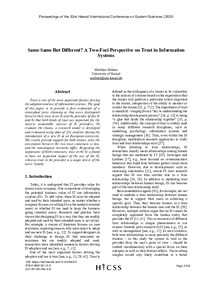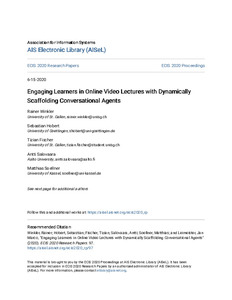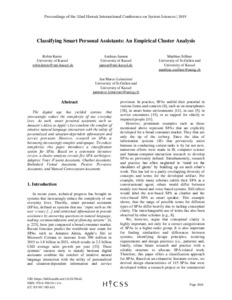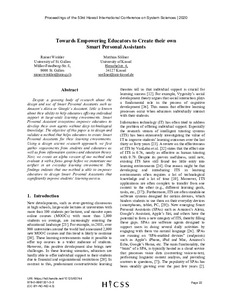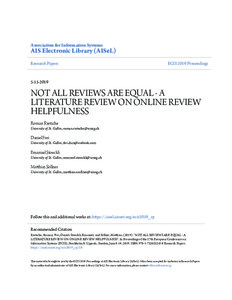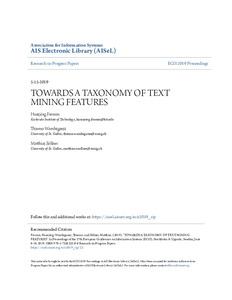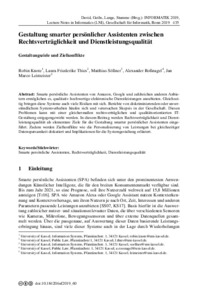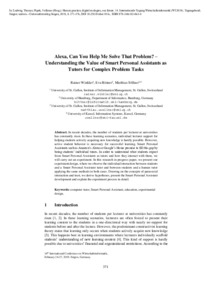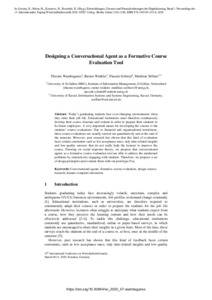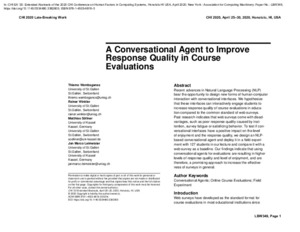Suche
Anzeige der Dokumente 1-10 von 19
Konferenzveröffentlichung

 Same Same But Different? A Two-Foci Perspective on Trust in Information Systems
Same Same But Different? A Two-Foci Perspective on Trust in Information Systems
(ScholarSpace, 2020-01-07)
Trust is one of the most important factors driving the adoption and use of information systems. The goal of this paper is to provide a first evaluation of a conceptual piece claiming a) that users distinguish between their trust in an IS and the provider of this IS and b) that both kinds of trust are important for the success sustainable success of IS providers. To evaluate the claims, a research model is developed and evaluated using data of 234 students during the introduction of a new IS at an European university. ...
Konferenzveröffentlichung
 Engaging Learners in Online Video Lectures with Dynamically Scaffolding Conversational Agents
Engaging Learners in Online Video Lectures with Dynamically Scaffolding Conversational Agents
(Association for Information Systems, 2020)
Online education creates new opportunities for learners, which has led to sharply increasing enrollment in the last few years. Despite these benefits, past research shows that the lack of individual interaction with educators creates low learner engagement that leads to high attrition rates, which remains a major challenge in the field. Dynamically scaffolding conversational agents built into online video lectures promise to address this problem by individually interacting with learners, similar to educators’ scaffolding ...
Konferenzveröffentlichung

 Classifying Smart Personal Assistants: An Empirical Cluster Analysis
Classifying Smart Personal Assistants: An Empirical Cluster Analysis
(University of Hawaii at Manoa, Hamilton Library, ScholarSpace, 2019)
The digital age has yielded systems that increasingly reduce the complexity of our everyday lives. As such, smart personal assistants such as Amazon’s Alexa or Apple’s Siri combine the comfort of intuitive natural language interaction with the utility of personalized and situation-dependent information and service provision. However, research on SPAs is becoming increasingly complex and opaque. To reduce complexity, this paper introduces a classification system for SPAs. Based on a systematic literature review, a ...
Konferenzveröffentlichung

 Towards Empowering Educators to Create their own Smart Personal Assistants
Towards Empowering Educators to Create their own Smart Personal Assistants
(ScholarSpace, 2020)
Despite a growing body of research about the design and use of Smart Personal Assistants such as Amazon’s Alexa or Google’s Assistant, little is known about their ability to help educators offering individual support in large-scale learning environments. Smart Personal Assistant ecosystems empower educators to develop their own agents without deep technological knowledge. The objective of this paper is to design and validate a method that helps educators to create Smart Personal Assistants as learning tutors. Using ...
Konferenzveröffentlichung
 Not All Reviews are Equal - a Literature Review on Online Review Helpfulness
Not All Reviews are Equal - a Literature Review on Online Review Helpfulness
(Association for Information Systems, 2019)
The amount of online reviews is growing significantly. Between 2014 and 2017, the number of reviews for TripAdvisor grew by 300% and for Yelp by 208%. However, not all online reviews are equally valuable. Some reviews are perceived to be more helpful or trustworthy then others. Hence, plethora of scholars have investigated the role of online reviews and researched factors and characteristics determining its helpfulness. Nevertheless, mixed findings were found. Consequently, the purpose of our paper is to present a ...
Konferenzveröffentlichung
 Towards A Taxonomy of Text Mining Features
Towards A Taxonomy of Text Mining Features
(Association for Information Systems, 2019)
Recently, text mining has received special attention from both researchers and practitioners, since it enables the development of intelligent and automated services. Text mining has been influenced by different disciplines like computer science, statistics, computational linguistics and library and information sciences. However, text mining features that evolved in one particular discipline are often unknown or rarely used in the other disciplines. No scientific feature framework exits which facilitates costly feature ...
Konferenzveröffentlichung

 Gestaltung smarter persönlicher Assistenten zwischen Rechtsverträglichkeit und Dienstleistungsqualität
Gestaltung smarter persönlicher Assistenten zwischen Rechtsverträglichkeit und Dienstleistungsqualität
(Gesellschaft für Informatik e.V. (GI), 2019)
Smarte persönliche Assistenten von Amazon, Google und zahlreichen anderen Anbietern ermöglichen es, qualitativ hochwertige elektronische Dienstleistungen anzubieten. Gleichzeitig bringen diese Systeme auch viele Risiken mit sich. Berichte von diskriminierenden oder unverständlichem Systemverhalten häufen sich und verursachen Skepsis in der Gesellschaft. Diesen Problemen kann mit einer gleichermaßen rechtsverträglichen und qualitätsorientierten ITGestaltung entgegengewirkt werden. In diesem Beitrag werden Rechtsvert ...
Konferenzveröffentlichung

 Alexa, Can You Help Me Solve That Problem? - Understanding the Value of Smart Personal Assistants as Tutors for Complex Problem Tasks
Alexa, Can You Help Me Solve That Problem? - Understanding the Value of Smart Personal Assistants as Tutors for Complex Problem Tasks
(universi - Universitätsverlag Siegen, 2019)
In recent decades, the number of students per lecturer at universities has constantly risen. In these learning scenarios, individual lecturer support for helping students actively acquiring new knowledge is hardly possible. However, active student behavior is necessary for successful learning. Smart Personal Assistants such as Amazon’s Alexa or Google’s Home promise to fill this gap by being students’ individual tutors. In order to understand what students expect from Smart Personal Assistants as tutors and how they ...
Konferenzveröffentlichung
 Designing a Conversational Agent as a Formative Course Evaluation Tool
Designing a Conversational Agent as a Formative Course Evaluation Tool
(GITO Verlag, 2020)
Today’s graduating students face ever-changing environments when they enter their job life. Educational institutions must therefore continuously develop their course structure and content in order to prepare their students to be future employees. A very important means for developing the courses is the students’ course evaluations. Due to financial and organizational restrictions, these course evaluations are usually carried out quantitatively and at the end of the semester. However, past research has shown that this ...
Konferenzveröffentlichung

 A Conversational Agent to Improve Response Quality in Course Evaluations
A Conversational Agent to Improve Response Quality in Course Evaluations
(Association for Computing Machinery, 2020)
Recent advances in Natural Language Processing (NLP) bear the opportunity to design new forms of human-computer interaction with conversational interfaces. We hypothesize that these interfaces can interactively engage students to increase response quality of course evaluations in education compared to the common standard of web surveys. Past research indicates that web surveys come with disadvantages, such as poor response quality caused by inattention, survey fatigue or satisficing behavior. To test if conversational ...

